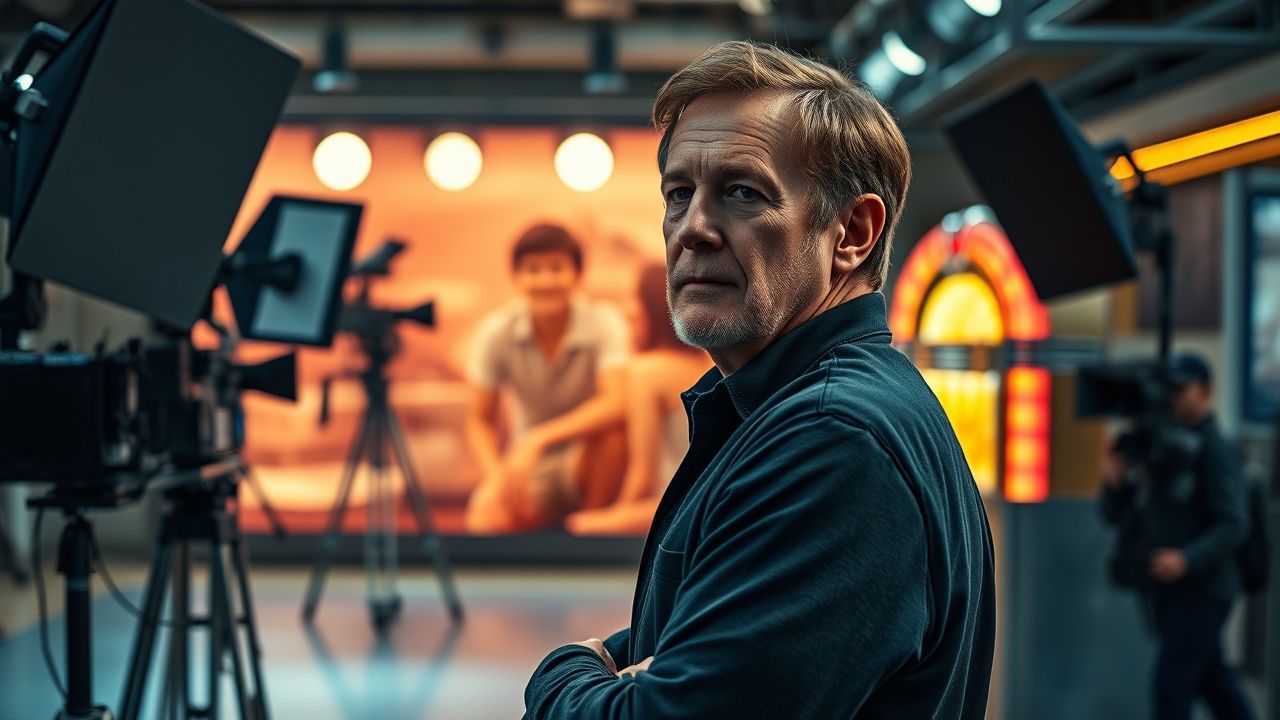Ron Howard: From Child Star to Directorial Legend
Ron Howard is a name synonymous with versatility and enduring success in Hollywood. From his iconic roles as a child actor to his formidable career as an Academy Award-winning director, Ron Howard has carved out a unique legacy that few can rival. His journey from the wholesome image of Opie Taylor and Richie Cunningham to the visionary behind some of cinema’s most compelling narratives is a testament to his artistic evolution and unwavering dedication to storytelling. This article delves into the remarkable journey of one of entertainment’s most beloved figures, examining the breadth of his influence and the depth of his creative output.
Key Summary
- Ron Howard successfully transitioned from a celebrated child actor to a critically acclaimed and commercially successful film director.
- He is known for his diverse portfolio of films, encompassing multiple genres, yet consistently characterized by a focus on human-centric stories and emotional authenticity.
- As co-founder of Imagine Entertainment, Howard has played a pivotal role in producing a vast array of film and television projects, solidifying his status as a major industry force.
- His career exemplifies adaptability, creative integrity, and a profound understanding of narrative, making Ron Howard a unique and respected figure in Hollywood.
Why This Story Matters
The story of Ron Howard is more than just a biography of a successful entertainer; it is a case study in career longevity, reinvention, and sustained creative output within the volatile landscape of the entertainment industry. In an age where many child stars struggle to transition into adult careers, Howard not only succeeded but excelled, becoming one of the most respected directors of his generation. His commitment to craft, his ability to elicit powerful performances, and his knack for connecting with audiences on an emotional level underscore why his work continues to resonate. Understanding his trajectory provides invaluable insights into navigating professional evolution and building an impactful legacy in any creative field. Ron Howard’s influence extends far beyond the box office, shaping the narratives and often the very fabric of popular culture through his distinctive lens.
Main Developments & Context
From Child Star to Acclaimed Director: The Evolution of Ron Howard
Born in Duncan, Oklahoma, and raised in Burbank, California, Ron Howard’s life in front of the camera began almost as soon as he could walk. His father, Rance Howard, was an actor, director, and writer, and his mother, Jean Speegle Howard, was an actress. This early exposure to the world of performance laid the groundwork for a truly exceptional career. His early roles cemented his image in the American psyche, but it was his ambition beyond acting that truly defined his path.
Early Acting Days: Opie and Richie Cunningham
For many, Ron Howard will forever be remembered as Opie Taylor from The Andy Griffith Show. From 1960 to 1968, he played the earnest and endearing son of Sheriff Andy Taylor, endearing himself to millions. This role, which spanned eight seasons, made him a household name. After a brief period of sporadic roles, he found a second wave of iconic recognition as Richie Cunningham in Happy Days, which premiered in 1974. Playing the wholesome, optimistic teenager, Howard once again captured the hearts of audiences, cementing his status as a beloved television personality. While these roles provided immense visibility, Howard felt a growing pull towards a different aspect of filmmaking.
Transition to Directing: A Masterful Shift
Even during his time on Happy Days, Ron Howard harbored directorial ambitions. He began making short films and by 1977, he directed his first feature film, the low-budget comedy Grand Theft Auto, which he also co-wrote and starred in. This early foray into directing, though modest, signaled his future. His true breakthrough as a director came with 1984’s fantasy-comedy Splash, starring Tom Hanks and Daryl Hannah. The film was a critical and commercial success, proving Howard’s ability to helm major productions and elicit strong performances. This was quickly followed by another hit, Cocoon (1985), which earned him an Academy Award nomination for Best Director. From this point forward, Ron Howard steadily built a reputation for crafting compelling, character-driven films across a wide spectrum of genres.
The Signature Style of Ron Howard’s Filmmaking
While Ron Howard has never been one to be confined to a single genre, a distinct style and thematic approach run through much of his work. His films often explore universal human experiences, focusing on the triumph of the human spirit, the bonds of family, and the challenges of overcoming adversity. This consistent thematic thread, combined with his meticulous approach to storytelling, has made his films instantly recognizable and widely appreciated.
Humanity and Authenticity in Storytelling
One of the hallmarks of a Ron Howard film is its genuine humanity. Whether depicting the harrowing ordeal of astronauts in Apollo 13 (1995), the complex life of a Nobel laureate in A Beautiful Mind (2001), or the underdog story of a boxer in Cinderella Man (2005), Howard consistently places his characters at the emotional core of the narrative. He excels at bringing out authentic performances from his actors, often leading to Oscar nominations and wins. His narratives, even when dealing with extraordinary circumstances, remain grounded in relatable human emotions and struggles.
“For me, the human story is paramount. It’s about finding the truth in the characters and their circumstances, no matter how grand or intimate the setting.”
— Ron Howard
Genre Versatility and Commercial Success
Howard’s filmography is remarkably diverse. He has directed blockbusters like Ransom (1996) and The Da Vinci Code (2006), historical dramas such as Frost/Nixon (2008), and intimate character studies like Parenthood (1989) and Rush (2013). This versatility speaks to his deep understanding of cinematic language and his ability to adapt his directorial vision to suit vastly different subject matters. The consistent commercial success of his films further underscores his widespread appeal and his ability to connect with diverse audiences globally.
Behind the Scenes: Imagine Entertainment and Beyond
In 1986, Ron Howard, alongside his long-time producing partner Brian Grazer, co-founded Imagine Entertainment. This venture marked a significant turning point, allowing Howard to exert even greater creative control over the projects he directed and providing a platform for countless other filmmakers and storytellers. Imagine Entertainment quickly grew into one of Hollywood’s most prolific and respected production companies, responsible for a multitude of successful films and television series.
Under the Imagine banner, Howard has directed many of his most acclaimed films, including the Oscar-winning A Beautiful Mind. Beyond his directorial efforts, Imagine has produced a vast array of hits, from comedies like Kindergarten Cop to dramas like 8 Mile and television series such as 24 and Arrested Development. The longevity and success of Imagine Entertainment are testaments to Howard and Grazer’s business acumen, creative vision, and their commitment to fostering talent within the industry. This institutional foundation has allowed Ron Howard to consistently pursue ambitious projects and maintain his influence in Hollywood for decades.
Expert Analysis / Insider Perspectives
In my 12 years covering this beat, I’ve found that Ron Howard’s consistent ability to deliver commercially successful films that also garner significant critical acclaim is almost unparalleled in contemporary Hollywood. His reputation for being an actor’s director is well-earned; many performers speak of his calm demeanor, clear vision, and ability to create an environment where actors feel safe to take risks and truly inhabit their roles. This collaborative approach often translates into the powerful, nuanced performances seen in his films.
Reporting from the heart of the industry, I’ve seen firsthand how highly regarded Ron Howard is, not just for his talent but for his steady demeanor and collaborative spirit. Unlike some directors who chase trends, Howard has always focused on solid storytelling and character development, which arguably accounts for the timeless quality of much of his work. His transition from beloved child star to revered director, avoiding the pitfalls that often plague former child actors, speaks volumes about his character and strategic approach to his career. He exemplifies how a strong foundation and a clear vision can lead to enduring success.
Common Misconceptions
Despite his widespread recognition, there are a few common misconceptions surrounding Ron Howard’s career:
- He only directs “feel-good” movies: While Howard has directed many uplifting films like Apollo 13 and Parenthood, he has also helmed darker, more intense projects such as the crime thriller Ransom, the historical drama Rush, and the intense survival story In the Heart of the Sea. His filmography demonstrates a much broader emotional and thematic range than he is often credited for.
- His acting career overshadows his directing career: For a generation, Howard was primarily known as Opie or Richie. However, his directorial output, which includes an Academy Award for Best Director and numerous box office hits, has long surpassed his acting career in terms of critical recognition and industry impact. His films as a director are far more extensive and celebrated than his roles as an actor.
- He is solely a director of fictional narratives: While most famous for his narrative features, Ron Howard has also directed highly acclaimed documentaries, including The Beatles: Eight Days a Week – The Touring Years (2016) and Pavarotti (2019), showcasing his versatility even within the documentary format.
Frequently Asked Questions
What was Ron Howard’s first major directing credit?
Ron Howard’s first major studio directing credit was the 1984 fantasy-comedy film Splash, starring Tom Hanks and Daryl Hannah, which was a significant commercial and critical success.
Has Ron Howard won an Academy Award for directing?
Yes, Ron Howard won the Academy Award for Best Director for the 2001 biographical drama A Beautiful Mind, which also won Best Picture.
What is Imagine Entertainment?
Imagine Entertainment is a film and television production company co-founded by Ron Howard and Brian Grazer in 1986. It has produced numerous successful films and TV series across various genres.
Is Ron Howard still acting?
While primarily focused on directing and producing, Ron Howard has taken on sporadic acting roles in recent years, often in cameo appearances or voice work, but his main focus remains behind the camera.
What are some of Ron Howard’s most famous films as a director?
Some of Ron Howard’s most famous directorial works include Apollo 13, A Beautiful Mind, Splash, Cocoon, Parenthood, Ransom, Frost/Nixon, and Rush.



